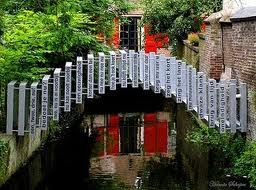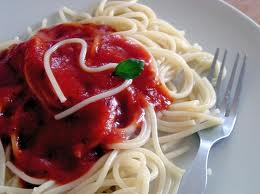“Word Bridge” (photo by Dutch artist Art Rock)
.
“How’s that?,” you say. Well, you might be a student of la bella lingua (Italian’s nickname, meaning, literally, the beautiful language) and speak it with some degree of proficiency, or, you may never have studied the language a day in your life…
Doesn’t matter, you still know un sacco di parole italiane (a sack, or a bunch of, Italian words)… Many words that have found their way into the English language—most of them even appearing in the English dictionary—are actually Italian. Here are a few examples:
Amore
Bambino
Bravo
Capisce
Cappuccino
Ciao
Espresso
Gelato
Mangia!
Mozzarella
Pasta
Pizza
Spaghetti
Tiramisu
Tortellini
Vino
True, many of these are related to food, but they are words, and you use them with ease and know what they mean – in other words, they’re part of your vernacular – you speak Italian!
.
[Sidebar: Alternatively, many English terms have been co-opted into daily Italian speech. Among them: il computer, la mountain bike, l’hamburger, l’email, lo scanner, lo shopping, lo scotch (to say Scotch tape), lo yoga, gli short (shorts), il weekend.}
.
Then there are the Italian words are so similar to English that they might as well be English, in the sense that you can guess them just by sight (perhaps even by sound). Here’s a sampling of those:
Aeroporto (airport)
Agosto (August)
Americano (American)
Aprile (April)
Attenzione (attention)
Autunno (autumn)
Blu (blue)
Caffè (coffee)
Cinema (cinema)
Communicazione (communication)
Concerto (concert)
Corretto (correct)
Eccellente (excellent)
Esatto (exact)
Fotografia (photography)
Frutta (fruit)
Idea (idea)
Importante (important)
Incredibile (incredible)
Informazione (information)
Insalata (salad)
Lettera (letter)
Novembre (November)
Ottobre (October)
Pigiame (pijamas)
Possibile (possible)
Ristorante (restaurant)
Scusi (Excuse me)
Settembre (September)
Tassì (taxi)
Tecnologia (technology)
Telefono (telephone)
Televisione (television)
Temperatura (temperature)
Treno (train)
All these linguistic similarities and borrowings from one language to another are evidence of both common Latin roots and the phenomenon of what I call language or linguistic crossover. Language crossover happens when people from different cultures and countries travel and mix, as is currently happening at a more accelerated pace than ever before, as our world becomes more interconnected with each passing day thanks to the expansion of the internet, social media, and other sharing methods made available by new tecnologia.
.
Finally, if you’re also a Spanish speaker, you know even more Italian… So many Spanish and Italian words are nearly identical, with only a small change in spelling and pronunciation. Here’s a sampling:
1, 2, 3, 4, 5, 6, 7, 8, 9 (uno, due, tre, quattro, cinque, sei, sette, otto, nove)
Acqua (agua)
Bagno (baño)
Banca (banco)
Bandiera (bandera)
Bianco (blanco)
Casa (casa)
Con (con)
Cucina (cocina)
Dentista (dentista)
Dove (donde)
Fiore (flor)
Gatto (gato)
Lampada (lampara)
Libro (libro)
Madre (madre)
Medico (medico)
Padre (padre)
Pane (pan)
Parola (palabra)
Quadro (cuadro)
Quando (cuando)
Quanto (cuanto)
Signora (señora)
Signore (señor)
Signorina (señorita)
Verde (verde)
So, there you have it. If you relish the idea of becoming bilingual (or trilingual), you’re well on your way—you’ve already got an eccellente head start on learning the world’s most beautiful language. Alla grande! (Great, nice!)
.
Che ne pensate? What do you think? How do Italian words and terms show up in your life? Leave a comment below!
Article previously published by Jodina as “You Already Speak Italian—Whether You know It or Not” in Viva l’Italia eZine, Summer 2011, at www.ItalyLocal.org.






Como hipanohabalnte, agradezo de la lista de palabras en espanol e italiano:)
Yo fatto lo yoga nel’ short.